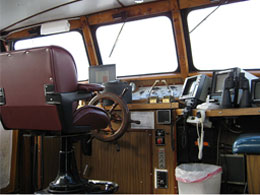Fishing Boat Skipper
Tasks & duties

- navigate the ship
- locate fish
- direct the crew
- assist with deck and fishing duties
- record the amount of fish caught for the day
- write reports and keep quality control records
- ensure the ship is properly equipped and maintained
- are responsible for the factory and its produce, and the health and safety of the crew
- hire new crew members.
Skills & knowledge

- vessel-handling skills and understanding of their vessel, its capabilities and equipment
- understanding of seafood market requirements
- good navigational skills
- knowledge of the habits and location of the species of fish they are catching
- the ability to identify fish using radars and echo-sounders
- knowledge of tides, waters, coastlines, marine hazards and the weather, and how these vary depending on where their vessel is
- skill using equipment such as radios and satellites
- understanding of health, safety and hygiene rules and regulations
- knowledge of the Fisheries Act, Maritime Safety Authority requirements and fishing quotas
- decision-making skills
- communication skills, and the ability to lead and manage a crew
- first aid skills.
Useful experience
- general deckhand work
- navigational work
- fish processing work
- other sea or boat work
- other commercial fishing experience.
Entry requirements
To become a fishing skipper you need to have a Master of Deep Sea Fishing Vessel Certificate, which takes approximately 10 years to complete. Inshore fishing skippers need to have a Inshore Launchmaster Certificate or a New Zealand Offshore Master Certificate, depending on the size of the vessel.
Secondary education
A good standard of English and maths is useful.
Tertiary education
A number of industry qualifications are needed to become a fishing skipper. These involve completing vessel time and classroom training. For further information contact the NZ Seafood Industry Training Organisation.
Training on the job
Most skills are gained on the job, as experience with vessels and the amount of time spent at sea are important factors in a fishing skipper's training. Fishing skippers must also attend first aid or fire-fighting courses.
Related courses
Boating and Sailing
Fishing and Seafood Industry
For more information, please refer to Career Services.
Document Actions
